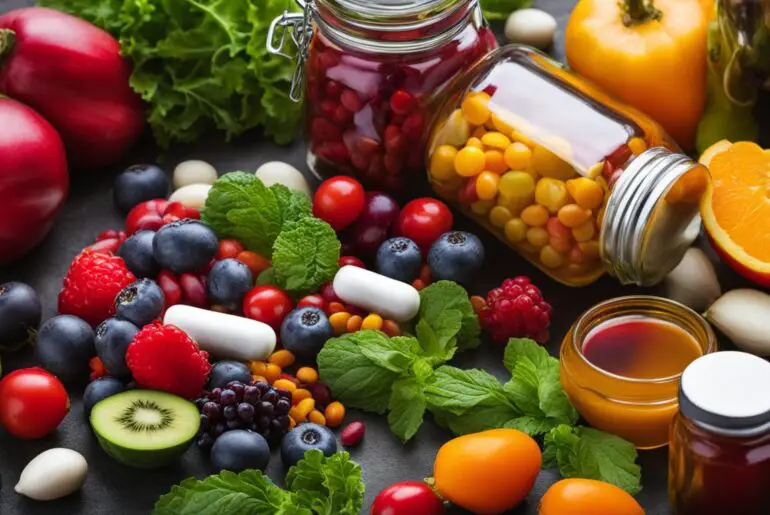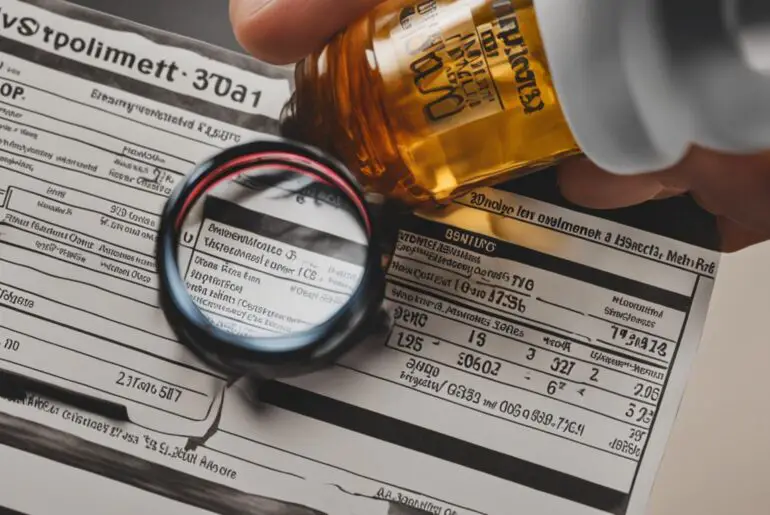Did you know that the U.S. Food and Drug Administration (FDA) has not deemed the HCG diet to be safe and effective for weight loss? It’s true. Despite its popularity, the HCG diet, which combines HCG diet supplements with a specific exercise regimen, lacks scientific evidence to support its claims. HCG, a hormone produced during pregnancy, is used as a prescription medication for fertility issues, but it is not approved for over-the-counter use.
While the HCG diet may result in short-term weight loss due to severe calorie restriction, it comes with significant risks and potential side effects. These include gallstone formation, irregular heartbeat, nutrient deficiencies, and imbalances of electrolytes. Individuals may also experience fatigue, irritability, depression, and swelling while on the HCG diet. It’s crucial to prioritize your health and explore safer methods of weight loss that endorse a sustainable and healthy lifestyle.
Key Takeaways:
- The HCG diet, which combines HCG diet supplements with an exercise regimen, lacks FDA approval and scientific evidence.
- Severe calorie restriction and potential side effects pose significant risks to individuals following the HCG diet.
- Opt for safer and healthier weight loss methods, such as a balanced diet and regular exercise, to achieve sustainable results.
- Consult a healthcare provider before starting any weight loss program, including the HCG diet.
- Maintain long-term weight loss by adopting a healthy lifestyle and addressing underlying factors contributing to weight gain.
The HCG Diet Protocol
The HCG diet protocol consists of two main phases that are crucial for effective weight management and dietary supplement use.
Phase 1: Loading Phase
During the loading phase, individuals following the HCG diet plan are required to consume high-calorie foods while simultaneously starting HCG supplementation. This phase is considered critical as it prepares the body for the subsequent fat burn phase and helps kickstart the weight loss process.
Phase 2: Fat Burn Phase
The fat burn phase of the HCG diet protocol is focused on significant calorie restriction. It involves limiting daily calorie intake to just 500 calories. This restricted diet consists of specific food choices that promote weight loss, such as lean meats, limited fruits and vegetables, and certain types of crackers. Additionally, the protocol emphasizes the elimination of certain foods, including oils and high-carb options, to maximize the effectiveness of the HCG diet plan.
It is essential to follow the protocol closely to achieve desired outcomes and track progress using measurement and tracking charts that monitor weight loss and dietary adherence. By strictly adhering to the HCG diet protocol, individuals can effectively manage their weight and optimize the benefits of dietary supplements.
| Phase | Description |
|---|---|
| Phase 1: Loading Phase | Consuming high-calorie foods and starting HCG supplementation |
| Phase 2: Fat Burn Phase | Calorie restriction to 500 calories per day and specific food choices |
Understanding HCG and Weight Loss
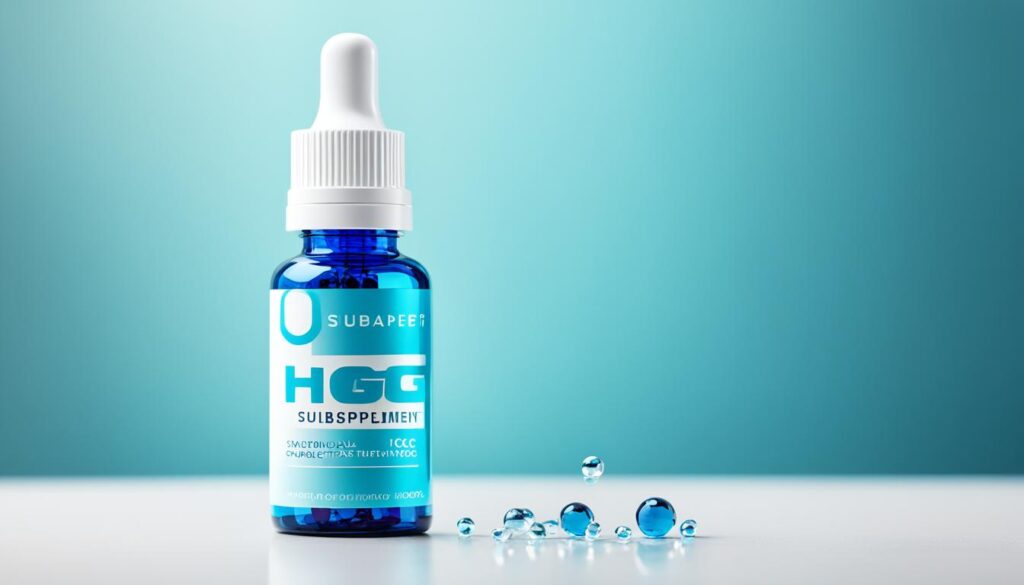
When it comes to weight loss, many people are turning to the HCG hormone as a potential solution. HCG, or human chorionic gonadotropin, is a natural hormone produced during pregnancy. While its primary role is to support fetal development, it has also been found to aid in weight loss when prescribed by a healthcare provider.
In recent years, sublingual HCG has emerged as an alternative to injections. Sublingual HCG refers to the method of taking the hormone by placing it under the tongue for absorption. This approach has been used since the late 1980s and offers a more convenient and pain-free option for those seeking the benefits of HCG.
To achieve weight loss results with HCG, it is essential to follow a prescribed diet alongside the hormone supplementation. The combination of the HCG hormone and the right diet plan works synergistically to maximize fat burning by the body. This can lead to impressive results in terms of weight loss and body contouring.
“The combination of the HCG hormone and the right diet plan works synergistically to maximize fat burning by the body.”
It is important to note that the HCG hormone is not a standalone solution for weight loss. It should only be used under the guidance and supervision of a healthcare provider. Additionally, it is crucial to understand that weight loss results may vary from person to person. Consistency, adherence to the recommended protocol, and compliance with the prescribed diet are key factors in achieving the desired outcomes.
As with any weight loss program, it is essential to approach it with realistic expectations and a focus on overall well-being. Healthy lifestyle changes, including regular exercise and a balanced diet, are crucial for long-term success. The HCG hormone, when integrated into a comprehensive weight loss plan, can serve as a valuable tool to kickstart your journey towards a healthier you.
Addressing Food Addictions in the HCG Diet
The HCG diet understands the impact of food addictions on weight gain and offers a strategic plan to overcome them. Certain processed foods, such as breads, fried foods, candies, and baked goods, contain a combination of fat, flour, sugar, and salt that can be highly addictive. To break the addiction pathway, the HCG diet recommends eliminating these addictive substances for a minimum of four weeks.
Unlike diet pills, which often prove ineffective, the HCG diet focuses on addressing food addictions as a key component of long-term weight loss success.
It is important to understand the influence of addictive foods on weight gain and how the HCG diet can help individuals break free from these unhealthy patterns. By removing addictive substances from their diet, individuals can regain control over their food choices and make healthier, sustainable decisions.
In the words of Dr. Emma, a leading expert in HCG diet: “Food addictions can be a major roadblock to weight loss. By eliminating addictive foods from your diet, you can break free from their hold and achieve long-lasting results.”
| Addictive Foods | Elimination Plan |
|---|---|
| Breads | Avoid all types of bread, including white, whole wheat, and processed bread products. |
| Fried Foods | Avoid all fried foods, such as french fries, fried chicken, and fried snacks. |
| Candies | Avoid all types of candies, including chocolates, gummies, and hard candies. |
| Baked Goods | Avoid pastries, cakes, cookies, and other high-sugar baked goods. |
By eliminating these addictive substances, individuals can retrain their taste buds and reduce cravings for unhealthy foods. This allows them to make better choices and develop a healthier relationship with food, ultimately leading to sustained weight loss.
The Importance of Breaking Food Addictions
Addressing food addictions within the HCG diet is essential for long-term weight loss success. By eliminating addictive foods, individuals can:
- Reduce cravings and reliance on unhealthy snacks
- Improve their relationship with food
- Make healthier choices that support their weight loss goals
- Break free from the cycle of yo-yo dieting
Unlike diet pills that solely focus on appetite suppression or metabolism boosting, the HCG diet recognizes the need to address the root cause of weight gain – food addictions. By breaking free from these addictive patterns, individuals can establish healthier eating habits and achieve lasting weight loss results.
Balancing Hormones for Weight Loss
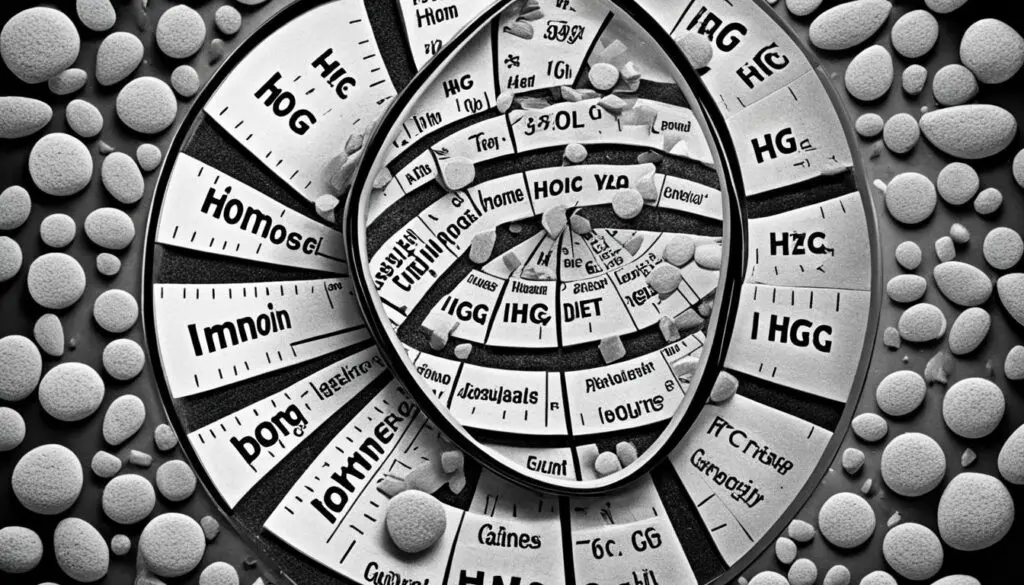
Hormone imbalance plays a significant role in weight gain and can hinder weight loss efforts. When hormones are out of balance, they can create physical and mental barriers that make it difficult to burn fat and achieve weight loss goals. Therefore, balancing hormones is crucial for successful weight management.
One effective method to identify hormone imbalances is through salivary hormone testing. This type of test, when used in conjunction with the HCG diet, can help identify imbalances caused by stress and other factors. By understanding the specific hormone imbalances, individuals can take targeted steps to restore balance and optimize their weight loss journey.
When hormones are balanced, individuals may experience improvements in various aspects of their overall well-being. Energy levels may increase, mental clarity may improve, and sleep patterns may become more restful. These positive changes can contribute to a sense of overall wellness and support sustainable weight loss.
However, it is important to note that hormone balance alone is not enough to achieve weight loss. It should be combined with a proper diet and lifestyle changes. The HCG diet, with its focus on healthy eating and portion control, serves as a complement to hormone balancing efforts and can enhance the effectiveness of weight loss strategies.
Benefits of Balancing Hormones for Weight Loss:
- Increased energy levels
- Improved mental clarity
- Enhanced sleep patterns
When hormones are balanced, individuals can overcome the obstacles that impede weight loss and achieve their desired results.
By addressing hormone imbalances and incorporating lifestyle changes, individuals can create a comprehensive approach to weight management. The combination of hormone balance, healthy eating habits, and regular exercise can lead to sustainable weight loss and long-term well-being.
| Hormone | Role | Impact on Weight Loss |
|---|---|---|
| Insulin | Regulates blood sugar levels | High insulin levels can contribute to weight gain and hinder fat burning |
| Cortisol | Manages stress response | Elevated cortisol levels can lead to increased belly fat and weight gain |
| Leptin | Regulates appetite | Leptin resistance can lead to overeating and weight gain |
| Thyroid hormones | Regulate metabolism | Imbalances can slow down metabolism and contribute to weight gain |
The Importance of Lifestyle Changes
The HCG diet should not be seen as a quick-fix solution for weight loss. It is important to make long-term lifestyle changes to maintain weight loss and achieve a healthier lifestyle.
Incorporating regular exercise into your routine is crucial for healthy living and sustained weight loss. An exercise routine that includes cardiovascular exercises like running, cycling, or swimming, as well as strength training exercises, can help boost metabolism, burn calories, and build lean muscle mass.
Following a balanced diet is another key aspect of a healthy lifestyle. This means including a variety of nutrient-rich foods such as fruits, vegetables, whole grains, lean proteins, and healthy fats. It’s also important to limit processed foods, sugary beverages, and excessive salt and sugar intake.
Making healthy food choices is essential for achieving your weight loss journey goals. Opt for whole, unprocessed foods whenever possible and prioritize portion control. Pay attention to hunger and fullness cues, and practice mindful eating to develop a healthier relationship with food.
Remember, the HCG diet can serve as a starting point for weight loss, but it should be used in conjunction with sustainable lifestyle changes. Consistency and commitment to healthy living will yield long-term results and contribute to overall well-being.
Committing to a healthy lifestyle doesn’t just mean short-term changes; it requires a shift in mindset and a long-term commitment to prioritize your well-being. Embrace the journey, make sustainable changes, and celebrate every small step towards a healthier, happier you.
Potential Risks and Side Effects
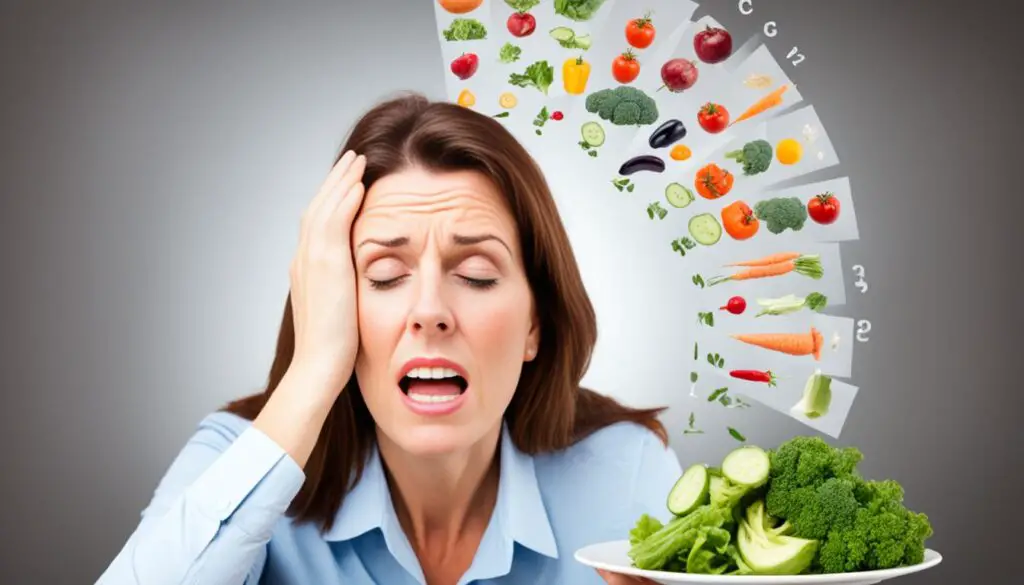
The HCG diet, like any weight loss program, carries potential risks and side effects. It is important to be aware of these before embarking on the HCG diet journey. While the HCG diet may promise fast weight loss results, it is essential to prioritize your health and well-being throughout the process.
Risks of the HCG Diet
1. Gallstone Formation: The severe calorie restriction involved in the HCG diet may increase the risk of gallstone formation.
2. Irregular Heartbeat: Extremely low-calorie diets, such as the HCG diet, can impact heart rhythm and result in irregular heartbeat.
3. Nutrient Deficiencies: The restricted food choices and limited calorie intake on the HCG diet can lead to nutrient deficiencies. It’s crucial to ensure you’re getting all the essential vitamins and minerals your body needs.
4. Electrolyte Imbalances: The HCG diet’s low-calorie nature may disrupt the balance of electrolytes in your body, which can have adverse effects on various bodily functions.
Side Effects of the HCG Diet
The HCG diet may also cause certain side effects, which can vary from person to person. While these side effects are generally temporary, they can still impact your well-being during the diet:
Fatigue: Feeling tired and low on energy is a common side effect reported by individuals following the HCG diet.
Irritability: The low-calorie intake and hormonal changes associated with the HCG diet may lead to increased irritability and mood swings.
Depression: Some individuals may experience feelings of sadness or depression while on the HCG diet. It’s important to speak with a healthcare provider if these feelings persist.
Swelling: Edema or swelling can occur during the HCG diet due to the hormonal changes in the body. This is typically temporary and resolves once the diet is completed.
It is essential to consult with a healthcare provider before beginning any weight loss program, including the HCG diet. They can offer personalized guidance based on your specific health needs and help you make an informed decision. Additionally, it is crucial to choose reputable weight loss supplements and avoid illegal over-the-counter products. Prioritizing your health and well-being should always be the top priority during any weight loss journey.
Maintaining Weight Loss After the HCG Diet

After completing the HCG diet, it is crucial to focus on maintaining weight loss in order to achieve long-term success. This involves adopting a healthy and balanced diet, monitoring portion sizes, and continuing to exercise regularly. By making sustainable lifestyle changes, you can ensure that the weight you have lost stays off for good.
One of the key components of maintaining weight loss is following a healthy diet. This means consuming a variety of nutrient-rich foods that provide your body with the necessary vitamins, minerals, and antioxidants it needs to function optimally. Emphasize whole, unprocessed foods such as fruits, vegetables, lean proteins, whole grains, and healthy fats. Limit your intake of sugary and processed foods, as well as foods high in saturated fats and sodium.
Monitoring portion sizes is also important when it comes to weight maintenance. Pay attention to your body’s hunger and fullness cues and aim to eat until you are satisfied, not overly full. Using smaller plates and bowls can help control portion sizes and prevent overeating. It may also be beneficial to practice mindful eating, savoring each bite and paying attention to the taste, texture, and satisfaction that food provides.
Regular exercise is another crucial factor in maintaining weight loss. Engaging in a consistent exercise regimen can help burn calories, build lean muscle mass, boost metabolism, and improve overall fitness and well-being. Aim for a combination of cardiovascular exercises, such as brisk walking, jogging, or cycling, and strength training exercises, such as weightlifting or bodyweight exercises. Find activities that you enjoy and make them a part of your daily routine.
“By adopting a healthy diet and maintaining a regular exercise regimen, you can ensure that the weight you have lost stays off for good.”
Gradually reintroducing foods that were restricted during the HCG diet can also contribute to long-term success in weight maintenance. However, it is important to do this mindfully and in moderation. Pay attention to how your body reacts to certain foods and make adjustments accordingly. It may be helpful to keep a food diary to track your eating habits and identify any patterns or triggers that could contribute to weight gain.
Addressing underlying factors that may contribute to weight gain is equally important. Stress, emotional eating, and other psychological factors can have a significant impact on weight management. Consider incorporating stress-reducing techniques, such as meditation or deep breathing exercises, into your daily routine. If emotional eating is a challenge, seek support from a therapist or counselor who can help you develop healthy coping mechanisms.
Weight Maintenance Tips:
- Focus on adopting a healthy and balanced diet.
- Monitor portion sizes and practice mindful eating.
- Engage in regular exercise and find activities you enjoy.
- Gradually reintroduce restricted foods in moderation.
- Address underlying factors like stress and emotional eating.
By following these strategies, you can effectively maintain weight loss and continue on your journey towards a healthier lifestyle.
Conclusion
The integration of HCG diet supplements and an exercise regimen can be a transformative approach to weight loss and achieving a healthier lifestyle. The HCG diet, although controversial, has shown potential for short-term weight loss results when followed closely. However, it is important to consider the potential risks associated with severe calorie restriction and consult with a healthcare provider before starting any weight loss program.
To maximize the benefits of the HCG diet, it is crucial to adhere to the protocol and track progress using measurement and tracking charts. It is also important to recognize that long-term success in maintaining weight loss relies on making sustainable lifestyle changes, including adopting a balanced diet and incorporating regular exercise into your routine.
In conclusion, while the HCG diet can provide initial weight loss results, it is essential to approach it with caution and prioritize overall health and well-being. A comprehensive and personalized approach, guided by healthcare professionals, is essential to ensure safe and effective weight loss.
FAQ
Is the HCG diet safe and effective for weight loss?
The HCG diet has not been shown to be safe and effective according to the FDA. Severe calorie restriction is recommended in the HCG diet, which can lead to short-term weight loss. However, there are risks associated with such low-calorie diets, including gallstone formation, irregular heartbeat, nutrient deficiencies, and an imbalance of electrolytes. Safer methods for weight loss, such as a balanced diet and regular exercise, should be considered.
What are the main phases of the HCG diet protocol?
The HCG diet protocol consists of two main phases. Phase 1, also known as the loading phase, involves consuming high-calorie foods while starting HCG supplementation. Phase 2, the fat burn phase, limits calorie intake to 500 calories per day and includes specific food choices. It is important to follow the protocol closely and track progress using measurement and tracking charts.
What is the role of HCG in the HCG diet?
HCG is a natural hormone produced during pregnancy, and it can be prescribed by a healthcare provider for weight loss. Sublingual HCG, taken under the tongue, has been used as an alternative to injections since the late 1980s. The HCG supplement must be taken alongside a prescribed diet to maximize fat burning by the body.
How does the HCG diet address food addictions?
The HCG diet recognizes the role of food addictions in weight gain and provides a plan to address them. Certain processed foods can be highly addictive due to their combination of fat, flour, sugar, and salt. The HCG diet focuses on completely removing these addictive substances for a minimum of 4 weeks to help break the addiction pathway.
Can balancing hormones help with weight loss?
Hormone imbalance can contribute to weight gain and make it difficult to lose weight. Balancing hormones can help break down physical and mental barriers to fat burning and weight loss. Salivary hormone testing, in conjunction with the HCG diet, can identify imbalances caused by stress and other factors.
Is it important to make lifestyle changes for long-term weight loss?
The HCG diet should not be seen as a quick-fix solution for weight loss. It is important to make long-term lifestyle changes to maintain weight loss and achieve a healthier lifestyle. This includes incorporating regular exercise into your routine, following a balanced diet, and making healthy food choices.
What are the potential risks and side effects of the HCG diet?
The HCG diet, like any weight loss program, carries potential risks and side effects. These can include gallstone formation, irregular heartbeat, nutrient deficiencies, and electrolyte imbalances. Side effects such as fatigue, irritability, and depression have also been reported. It is important to consult with a healthcare provider before starting any weight loss program, including the HCG diet.
How can weight loss be maintained after completing the HCG diet?
After completing the HCG diet, it is important to focus on maintaining weight loss. This involves adopting a healthy and balanced diet, monitoring portion sizes, and continuing to exercise regularly. Gradually reintroducing foods and finding a sustainable eating pattern can help ensure long-term success.
What should be considered when integrating HCG diet supplements and an exercise regimen?
The integration of HCG diet supplements and an exercise regimen can be a transformative approach to weight loss and achieving a healthier lifestyle. However, it is important to consider the potential risks, follow the protocol closely, and consult with a healthcare provider before starting any weight loss program. The HCG diet can provide short-term weight loss results, but long-term success relies on making sustainable lifestyle changes.



